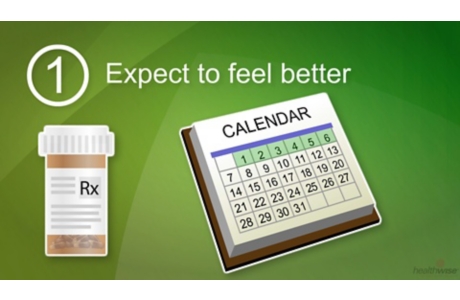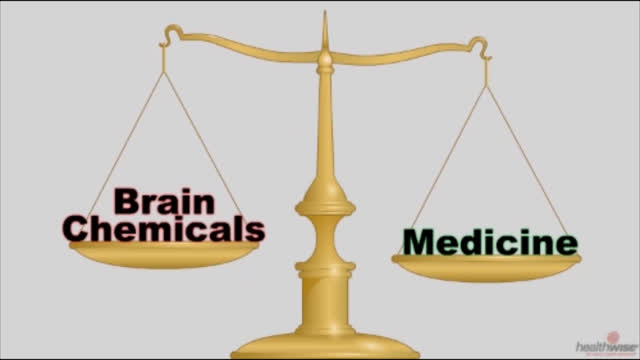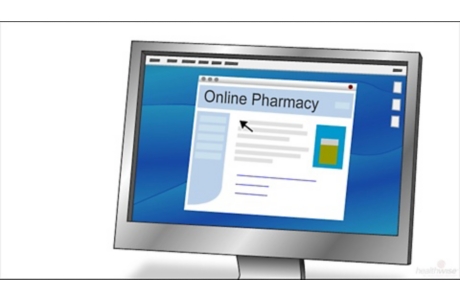Antidepressants
Information about this medicine
What are the most important things you need to know about your medicines?
Make sure you know about each of the medicines you take. This includes why you take it, how to take it, what you can expect while you’re taking it, and any warnings about the medicine.
The information provided here is general. So be sure to read the information that came with your medicine. If you have any questions or concerns, talk to your pharmacist or doctor.
Why are antidepressants used?
Antidepressants are used to help the symptoms of major depression.
They are also used for many other health conditions. These include pain, anxiety, and hot flashes.
What are some examples of antidepressants?
Here are some examples of antidepressants. For each item in the list, the generic name is first, followed by any brand names.
- amitriptyline
- bupropion (Wellbutrin)
- citalopram (Celexa)
- fluoxetine (Prozac)
- sertraline (Zoloft)
- venlafaxine (Effexor)
This is not a complete list of antidepressants.
How do antidepressants work?
Antidepressants help restore the normal balance of brain chemicals and help regulate your mood. When these brain chemicals are in proper balance, your depression may get better.
What are the side effects of antidepressants?
Some people may have an upset stomach, feel dizzy, or be constipated. Some may have a change in sexual desire or ability.
General information about side effects
All medicines can cause side effects. Many people don’t have side effects. And minor side effects sometimes go away after a while.
But sometimes side effects can be a problem or can be serious.
If you’re having problems with side effects, talk to your doctor. He or she may be able to lower your dose or change to a different medicine.
Always be sure you get specific information on the medicine you’re taking. For a full list of side effects, check the information that came with the medicine you’re using. If you have questions, talk to your pharmacist or doctor.
Cautions about antidepressants
Cautions for antidepressants include the following:
- If you plan to stop taking antidepressants, talk with your doctor first about how to do it safely. Your doctor may want you to slowly decrease how much you take. Suddenly stopping can cause side effects. It may also cause your depression to come back or get worse.
- Take your medicine for at least 6 months after you feel better. This can help keep you from getting depressed again. Your doctor may want you to take these medicines even longer.
Cautions for all medicines
- Allergic reactions: All medicines can cause a reaction. This can sometimes be an emergency. Before you take any new medicine, tell the doctor or pharmacist about any past allergic reactions you’ve had.
- Drug interactions: Sometimes one medicine may keep another medicine from working well. Or you may get a side effect you didn’t expect. Medicines may also interact with certain foods or drinks, like grapefruit juice and alcohol. Some interactions can be dangerous.
- Harm to unborn babies and newborns: If you are pregnant, trying to get pregnant, or breastfeeding, ask your doctor or pharmacist if any of the medicines you take could harm your baby.
- Other health problems: Before taking a medicine, be sure your doctor or pharmacist knows about all your health problems. Other health problems may affect your medicine. Or the medicine for one health problem may affect another health problem.
Always tell your doctor or pharmacist about all the medicines you take. This includes prescription and over-the-counter medicines, vitamins, herbs, and supplements. That information will help prevent serious problems.
Always be sure you get specific information on the medicine you’re taking. For a full list of warnings, check the information that came with the medicine you’re using. If you have questions, talk to your pharmacist or doctor.
Related topics
Current as of: May 28, 2019
Author: Healthwise Staff
Medical Review:Adam Husney, MD – Family Medicine & Kathleen Romito, MD – Family Medicine
This information does not replace the advice of a doctor. Healthwise, Incorporated, disclaims any warranty or liability for your use of this information. Your use of this information means that you agree to the Terms of Use. Learn how we develop our content.






